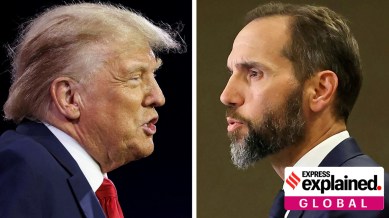Who is the US special counsel, central to dismissal of the documents case against Trump?
The criminal case against Donald Trump was dismissed by a judge who raised questions about the appointment of the special counsel, a lawyer appointed to independently investigate certain sensitive cases.

(Written by Saima Mehta)
A criminal case against former US President and current presidential candidate Donald Trump, related to his alleged illegal handling of government documents, was dismissed on Monday (July 15). Trump was accused of keeping classified documents in his private possession even after he vacated office in January 2021.
The dismissal has come as a relief for Trump and also highlighted the special counsel’s position in the US government.
US District Judge Aileen Cannon declared that Special Counsel Jack Smith, who was in charge of the case, was improperly selected and lacked the power to proceed with the lawsuit.
What is a special counsel?
A special counsel, earlier referred to as a Special Prosecutor or Independent Counsel, is a lawyer chosen to look into and possibly bring charges against cases suspected of misconduct, especially when the regular prosecutorial agency has a conflict of interest. This often involves situations with top government officials or other matters of great sensitivity, where being unbiased and free from outside influence is essential.
Government officials can file complaints to the counsel as well. “OSC’s (Office of Special Counsel) primary mission is to safeguard the merit system by protecting federal employees and applicants from prohibited personnel practices (PPPs), especially reprisal for whistleblowing,” its website states.
The idea of having special counsels in the United States has its roots in the Watergate scandal of the 1970s. At that time, President Richard Nixon’s Attorney General Elliot Richardson named Special Prosecutor Archibald Cox to look into claims of illegal activities in the White House.
The use of special counsels continued during the Iran-Contra scandal in the 1980s under President Ronald Reagan. Independent Counsel Lawrence Walsh was tasked with examining the secret arms deal with Iran and the government’s illegal support to anti-Communist groups in Nicaragua. Walsh’s inquiry led to the arrest and conviction of several high-level officials.
Special counsels function under rules that give them a significant level of independence, yet their major decisions are subject to possible veto by the Attorney General. This setup is intended to protect important investigations from political meddling and to maintain the public’s confidence in their fairness.
What forms the basis of special counsels’ powers?
The power to select special counsels comes from various federal statutes. The Civil Service Reform Act lays out the structure for overseeing federal workers, including procedures for dealing with misconduct. The Whistleblower Protection Act protects federal workers who expose illegal or unethical behaviour in the government.
Further, the Hatch Act limits the political involvement of federal workers to maintain non-partisanship in the federal workforce. The Uniformed Services Employment and Re-employment Rights Act ensures the job protection rights of military personnel.
Together, these statutes give the Department of Justice (DOJ), a federal executive branch of the United States government, the authority to bring in outside legal experts for intricate and possibly politically sensitive investigations.
How are special counsels appointed and what powers do they have?
The selection of special counsels is governed by the US Constitution’s Appointments Clause, which requires that “Officers of the United States” are nominated by the President and approved by the Senate. Nonetheless, the law permits heads of departments, such as the Attorney Generals who lead the DOJ, to appoint “junior officers” like special counsels without Senate approval.
Special counsels conduct their own investigations into criminal issues considered important for public interest. They are chosen for their integrity and legal knowledge.
They are empowered to look into and charge crimes under their jurisdiction, including cases of obstructing justice or lying under oath. Although they operate autonomously, they are still answerable to the Attorney General, who has the power to terminate their appointment for any wrongdoings.
The counsel decides when to wrap up their investigation and provides a secret report to the Attorney General.
What is the relevance to Trump’s case?
Judge Cannon’s decision to throw out the lawsuit against Trump underscores the intricate legal and constitutional issues that arise with the selection of special counsels. Cannon declared that the decision to appoint Special Counsel Jack Smith and provide him with funding was unconstitutional.
She wrote in her judgment, “The Superseding Indictment is DISMISSED because Special Counsel Smith’s appointment violates the Appointments Clause of the United States Constitution.” She said the Constitution gives only Congress or the president the authority to appoint a special counsel and not the AG, according to an NPR report.
This decision questions the traditional method of selecting special counsels and its legal basis. As an article in The Conversation notes, the fact that the Attorney General is appointed by the President, who is directly linked to a political party, questions can arise about the impartiality of the special counsel’s appointment.
It added that in a recent US Supreme Court ruling this year, past, current and future presidents were accorded partial immunity from prosecution. “While the legality of special counsels was not at issue in this case, Justice Clarence Thomas used his concurring opinion to challenge the legality of Smith’s appointment.” He also argued that no legislation has been passed to give the Attorney General the power to appoint a special counsel.
The author is an intern with The Indian Express.